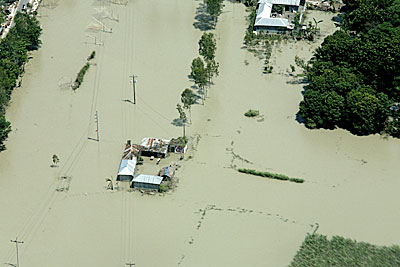Head bowed, Drew Neely* expected ridicule as he approached a crowd of approximately 500 Bangladeshis. After a sixth day of waiting in offices and pleading with official letters, Neely still was unable to receive final permission from authorities to distribute food that had been assembled for the crowd.
 Floodwaters flow through neighborhoods and streets in south Dhaka, the capital city of Bangladesh.
Floodwaters flow through neighborhoods and streets in south Dhaka, the capital city of Bangladesh.Yet, rather than accusations and raised fists, the comment that rose from the crowd was “bhaalo” (good). As they pointed their fingers at him, several began to cry, “Good man. Good man.”
“I can say the public isn’t mad at us,” Neely said after the Christian relief effort to Bengali Muslims was prohibited for the final time Aug. 21. Neely had repeatedly requested permission to distribute the food – an approval that would have afforded protection to help ensure the food would go to its intended recipients and not be misused.
“The community has had an opportunity to see me pour my life into this project and work extremely hard to show love to them,” Neely reflected.
“They understand he’s trying to help them,” said Thad Crisler*, a Southern Baptist relief worker. “To me, that was a recognition of his faithfulness to them to try to make that happen.”
Neely and three South Carolina volunteers, along with 50 local volunteers, had tried to put nearly 2,000 22-liter containers of food and medicine into the hands of those affected by monsoon-induced flooding in the southern part of Dhaka, the nation’s capital. The effort was partly funded by the South Carolina Baptist Convention.
Approximately 700 Bangladeshis have died over the past month and thousands more suffer from waterborne illnesses such as cholera and dysentery from contaminated floodwater.
To people in South Asia, mentioning flooding in Bangladesh is like Americans discussing a rash of tornados in the spring – it happens every year. Yet, for these people living sometimes less than 30 feet above sea level, the yearly expectation of more disease, more hunger and more suffering is a recurring tragedy.
“It ain’t easy being a blessing in Bangladesh,” South Carolina volunteer Dewey Ogburn* said. “I can’t make a difference in every person’s life in Dhaka, but I can make a difference in one person’s life.”
*Names changed for security reasons.